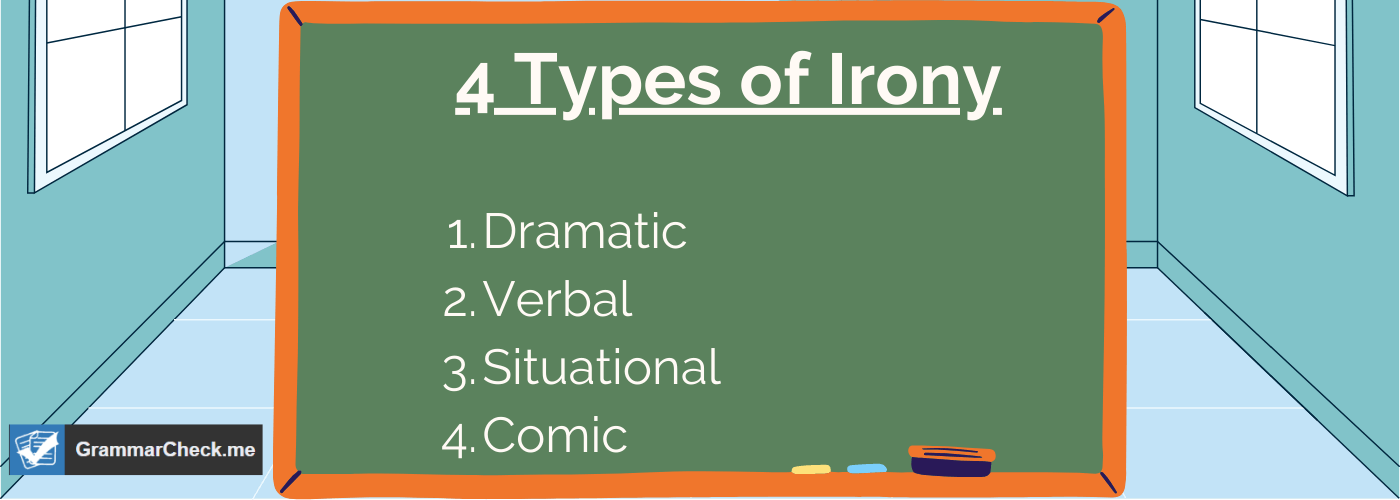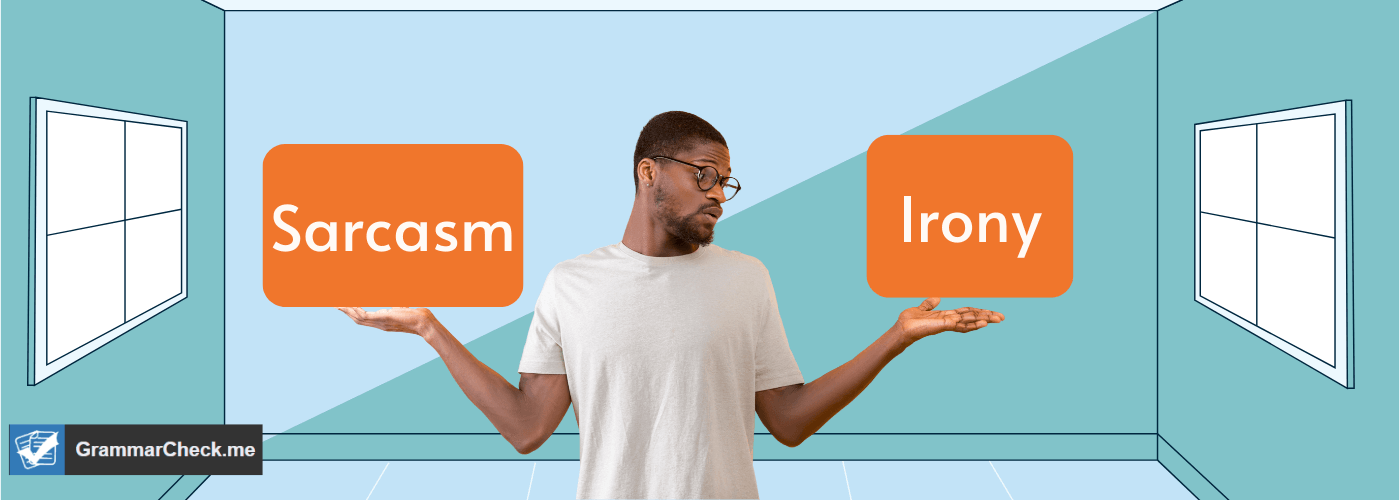Irony and sarcasm are two words that are often confused for each other. However, there is a big difference between the two. In fact, many people think that these two terms are the same thing! In this article, we will explore the difference between irony and sarcasm and how to use them correctly. We will also look at some examples of each.
What Is Irony?

Irony is a figure of speech that often uses words with opposite meaning for humor or effect.
- For instance, someone might say “I’m so full, I could eat a horse” after finishing a small meal. This would be an example of verbal irony because the speaker is using words to mean the opposite of what they actually mean.
There are four main types of irony:
- Verbal Irony: Verbal irony is when you say something different than what you actually mean.For example: If your boss asks how your weekend was and you say “It was great! I loved getting up at 6 am to clean the house and do laundry,” that’s verbal irony. You’re actually saying the exact opposite of what you really mean.
- Situational Irony: Situational irony occurs when the expected outcome of a situation is subverted. This is often used to generate humor. For example: Imagine a situation in which a young child is trying to be quiet and sneak around the house. The expected outcome would be that the child goes unnoticed. However, if the child ends up making a loud noise and getting caught, this would be an example of situational irony.
- Dramatic Irony: Dramatic irony occurs when the writer tells the reader something that the character does not know.For example: In Romeo and Juliet, the reader knows that Juliet is only pretending to be dead, but Romeo does not. As a result, when Romeo takes his own life in Juliet’s tomb, the reader experiences a sense of tragedy that Romeo does not.
- Comic Irony: Comic irony is a type of irony that is used to comedic effect. It often takes the form of satire, poking fun at a person or situation. It is often used to defuse tense situations or to make light of a situation that is otherwise serious. For example: Imagine you’re at a party and you see your ex across the room. You say to your friend, “I’m going to go talk to her,” but as you’re walking over, you trip and fall. The ironic outcome here is that you wanted to talk to her, but instead, you made a fool of yourself.
Takeaway: Irony can be used for many different purposes, including to create humor or to make a point.
What Is Sarcasm?
Sarcasm is saying the opposite of what you mean. When using different types of grammar its important to keep context in mind.
For example:
- If someone spills their drink, you might say, “Nice going, clumsy!”
- If your friend notices you have a bad outfit on, she might say “OMG you look too cute tonight!”
- When your friend studies for a test all night and fails, you tell him “Great job on that test!”
- When you go to pay a very expensive bill and say, “wow this is pricy!”
Sarcasm can be used to make a point or to defuse a tense situation. It can also be used as a way to express frustration or anger.
Tip: Use sarcasm sparingly. Overusing a sarcastic tone and sarcastic statements can be distracting.
What Are Examples Of Sarcasm?
Here are 3 very common examples of sarcasm.
- “Oh, because clearly I have nothing better to do than listen to your unsolicited advice.”
- “Well, that’s just great. I absolutely love waking up to a flat tire!”
- “Oh, fantastic. Another meeting to discuss the endless possibilities of rearranging the office supplies.”
Key Differences of Irony vs Sarcasm

Verbal irony and sarcasm are often used interchangeably, but there is actually one key difference between the two.
- Sarcasm is always intentional – When someone is being sarcastic, they are deliberately poking fun at someone or something. In contrast, irony can be either intentional or accidental. For example: If a friend tells you that they just won the lottery, only to reveal that they actually lost their ticket, that would be an ironic situation. However, if they told you they won the lottery when they knew they lost their ticket, that would be sarcasm.
Both verbal irony and sarcasm happen regularly in everyday life. The next time your buddy makes an ironic remark in a mocking tone, you’ll know just what he’s doing.
Examples of Irony
1) Comic Irony
If someone trips on their way to the stage to receive an award for gracefulness, that would be an instance of comic irony.
2) Dramatic Irony
One classic example of dramatic irony is in Shakespeare’s Romeo and Juliet. In the famous balcony scene, Romeo is hiding in the shadows beneath Juliet’s balcony, declaring his love for her.
Juliet, not knowing that Romeo is there, laments that she wishes they could be together, but knows it is impossible because of their feuding families.
The irony lies in the fact that the two lovers are so close to each other but are unaware of it.
3) Situational Irony
Imagine you’re at a party and you see your friend across the room. You shout to her, “I’m so glad you came!” But as soon as the words leave your mouth, she turns and leaves the party. You didn’t actually want her to come, but your exclamation was Situational irony. Cosmic irony is one type of situational irony that often includes a higher power.
4) Verbal Irony
If a child spills his milk and you say, “Good job! Now we can have a nice clean floor,” the child may not understand that you are being sarcastic. He may actually think you are complimenting him on his cleaning skills.
What Is Satire?
Satire is a form of humor that often uses irony and exaggeration to make a point. It can be used to poke fun at individuals or groups, or to comment on social issues. Satire often relies on stereotypes and caricatures to get its point across, and can be found in all forms of media, from today’s pop culture, political cartoons, and movies to books and articles.
It can be hard for some people to understand the difference between irony vs sarcasm & satire. Remember that irony & sarcasm are forms of expression. Irony pertains to specific situations.
What Are Examples Of Satire?
This list contains 3 examples of how satire can be used correctly in writing or entertainment.
- Animal Farm by George Orwell – This novel satirizes the events leading up to the Russian Revolution and the subsequent Soviet Union by depicting them through the lens of a farm where animals overthrow their human masters.
- The Daily Show with Jon Stewart – This satirical news program uses humor and irony to comment on current events, politics, and media. It presents news in a comedic format to highlight hypocrisy and absurdities in society.
- Gulliver’s Travels by Jonathan Swift – This classic work of literature satirizes various aspects of human nature and society through the travels of Lemuel Gulliver, who encounters fictional lands with strange customs and absurdities that parallel societal issues.
FAQs – Irony Vs Sarcasm
Irony pertains to situations while satire and sarcasm are forms of expression. At first it can be difficult to know the difference between the two. However, sarcasm and iron do have a different meaning.
The four main types of irony are dramatic irony, comic irony, verbal irony, and situational irony.
Sarcasm is a type of verbal irony where people say things that are the opposite of what they mean in order to make a point or express frustration. Sarcastic statements are used to communicate feelings of annoyance or contempt. Verbal irony occurs when the individual speaking says the opposite of what they mean.
An example of irony would be if somebody was to say “I’m so excited for my vacation!” and then they found out their flight was delayed. The situation is ironic because the person is excited for their vacation, but the event that’s happening (their flight being delayed) is going to make it harder for them to enjoy their time off.
Cruel irony is a harsh situation that causes people distress. For example, imagine you’re dying of cancer and your last days are filled with pain and suffering. That would be a cruel irony. Another example might be if you’re poor and struggling to make ends meet, but then you lose your job and become even poorer. That would be another cruel irony.
Hyperbole is an exaggeration for effect. Irony is a contrast between what is said and what is meant. For example,
Hyperbole: This is the best-tasting chocolate in the world!
Verbal Irony: I’m going to have to throw this chocolate out because it tastes so nasty.
When someone says one thing but means the opposite, that’s irony. For example, if your mom says “I’m so happy you’re home,” but really she’s mad because you’re late, that’s irony.
The Bottom Line
Irony and sarcasm may seem similar on the surface, but they are actually quite different. We hope this article has cleared up any confusion you may have had about these two terms. Now that you know the difference, try using irony and sarcasm in your own writing!
